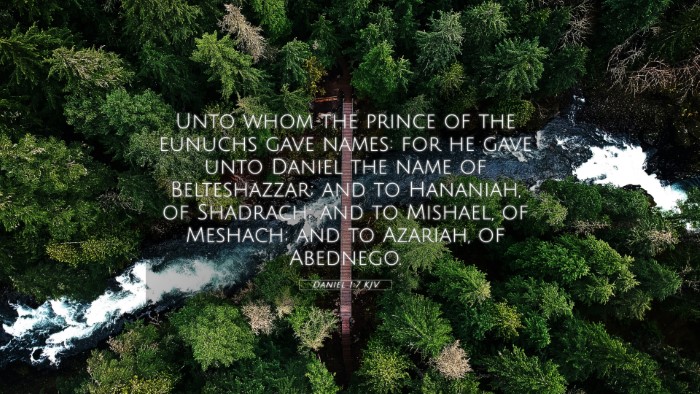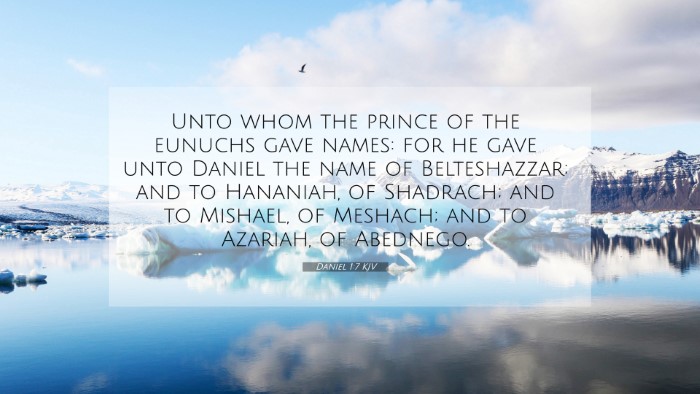Old Testament
Genesis Exodus Leviticus Numbers Deuteronomy Joshua Judges Ruth 1 Samuel 2 Samuel 1 Kings 2 Kings 1 Chronicles 2 Chronicles Ezra Nehemiah Esther Job Psalms Proverbs Ecclesiastes Song of Solomon Isaiah Jeremiah Lamentations Ezekiel Daniel Hosea Joel Amos Obadiah Jonah Micah Nahum Habakkuk Zephaniah Haggai Zechariah MalachiDaniel 1:7 Similar Verses
Daniel 1:7 Cross References
Unto whom the prince of the eunuchs gave names: for he gave unto Daniel the name of Belteshazzar; and to Hananiah, of Shadrach; and to Mishael, of Meshach; and to Azariah, of Abednego.
Uncover the Rich Themes and Topics of This Bible Verse
Listed below are the Bible themes associated with Daniel 1:7. We invite you to explore each theme to gain deeper insights into the Scriptures.
Daniel 1:7 Cross Reference Verses
This section features a detailed cross-reference designed to enrich your understanding of the Scriptures. Below, you will find carefully selected verses that echo the themes and teachings related to Daniel 1:7 KJV. Click on any image to explore detailed analyses of related Bible verses and uncover deeper theological insights.
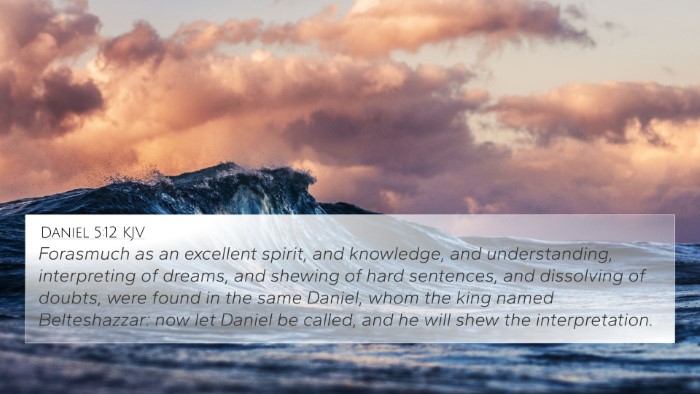
Daniel 5:12 (KJV) »
Forasmuch as an excellent spirit, and knowledge, and understanding, interpreting of dreams, and shewing of hard sentences, and dissolving of doubts, were found in the same Daniel, whom the king named Belteshazzar: now let Daniel be called, and he will shew the interpretation.
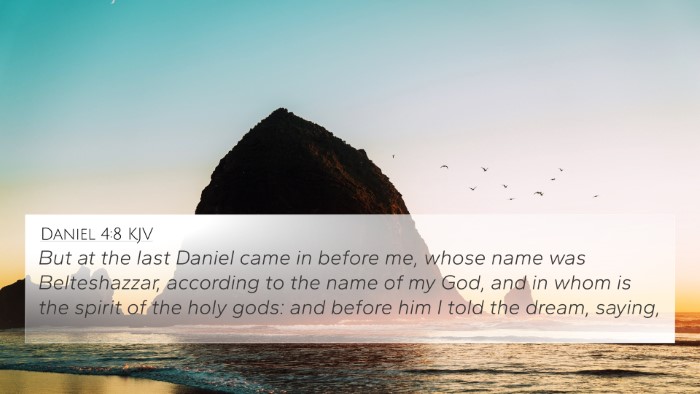
Daniel 4:8 (KJV) »
But at the last Daniel came in before me, whose name was Belteshazzar, according to the name of my God, and in whom is the spirit of the holy gods: and before him I told the dream, saying,
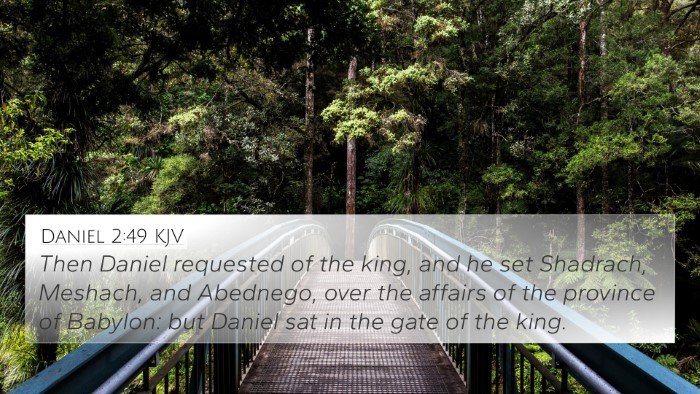
Daniel 2:49 (KJV) »
Then Daniel requested of the king, and he set Shadrach, Meshach, and Abednego, over the affairs of the province of Babylon: but Daniel sat in the gate of the king.

Daniel 1:3 (KJV) »
And the king spake unto Ashpenaz the master of his eunuchs, that he should bring certain of the children of Israel, and of the king's seed, and of the princes;
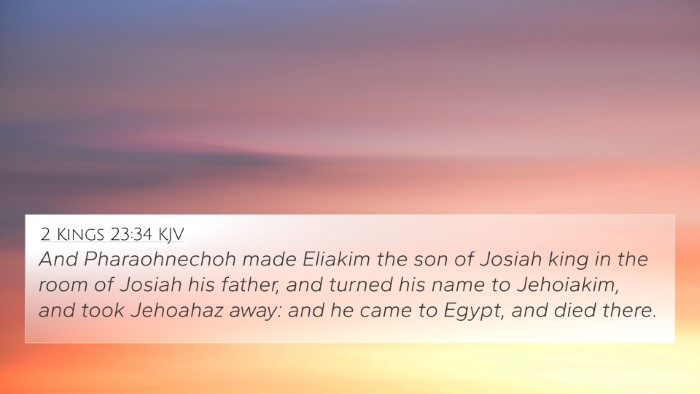
2 Kings 23:34 (KJV) »
And Pharaohnechoh made Eliakim the son of Josiah king in the room of Josiah his father, and turned his name to Jehoiakim, and took Jehoahaz away: and he came to Egypt, and died there.
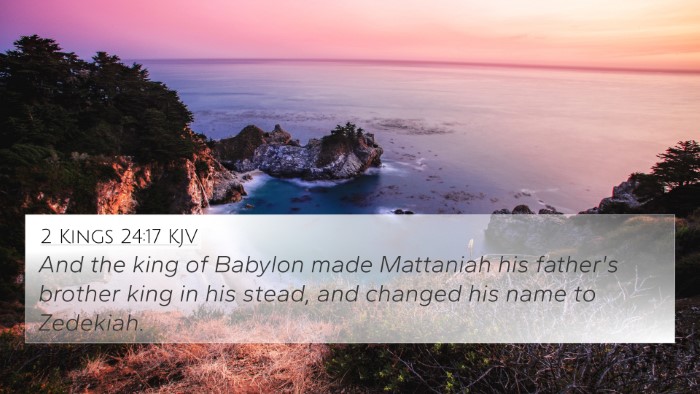
2 Kings 24:17 (KJV) »
And the king of Babylon made Mattaniah his father's brother king in his stead, and changed his name to Zedekiah.
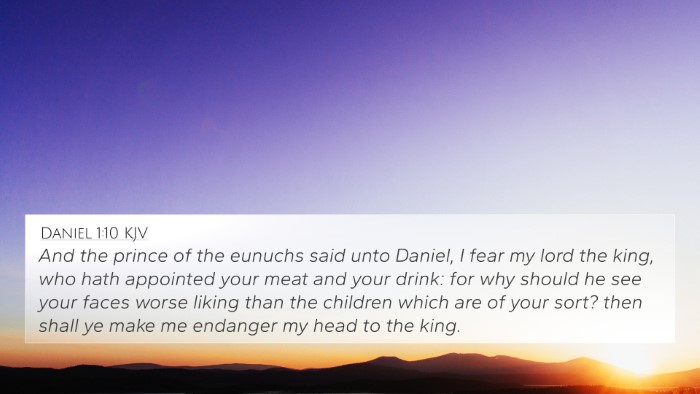
Daniel 1:10 (KJV) »
And the prince of the eunuchs said unto Daniel, I fear my lord the king, who hath appointed your meat and your drink: for why should he see your faces worse liking than the children which are of your sort? then shall ye make me endanger my head to the king.
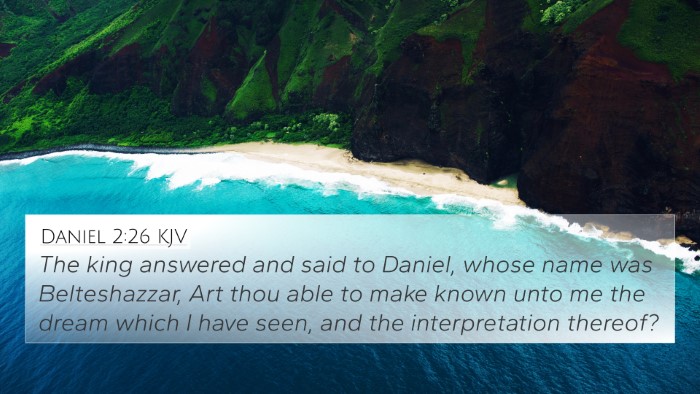
Daniel 2:26 (KJV) »
The king answered and said to Daniel, whose name was Belteshazzar, Art thou able to make known unto me the dream which I have seen, and the interpretation thereof?

Daniel 3:12 (KJV) »
There are certain Jews whom thou hast set over the affairs of the province of Babylon, Shadrach, Meshach, and Abednego; these men, O king, have not regarded thee: they serve not thy gods, nor worship the golden image which thou hast set up.
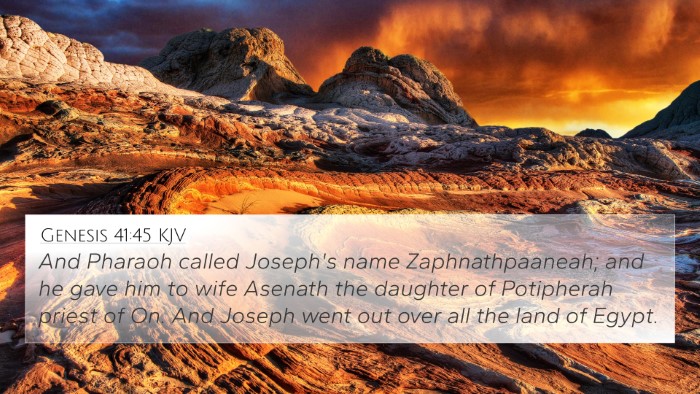
Genesis 41:45 (KJV) »
And Pharaoh called Joseph's name Zaphnathpaaneah; and he gave him to wife Asenath the daughter of Potipherah priest of On. And Joseph went out over all the land of Egypt.
Daniel 1:7 Verse Analysis and Similar Verses
Understanding Daniel 1:7
In Daniel 1:7, the verse states, "To them the chief of the eunuchs gave names: he gave Daniel the name Belteshazzar, to Hananiah he called Shadrach, to Mishael he called Meshach, and to Azariah he called Abednego." This verse marks a critical moment in the narrative of Daniel, encapsulating key themes of identity, cultural assimilation, and God's sovereignty.
Insights from Public Domain Commentaries
-
Matthew Henry:
Henry emphasizes the significance of names in biblical times, noting that they often reflected one's character or fate. The renaming of Daniel and his companions not only served as a means of assimilation into Babylonian culture but also attempted to strip them of their Jewish identity. Hence, the names they were given are seen as a point of contention against their faith and heritage.
-
Albert Barnes:
Barnes highlights the power dynamics at play; the chief of eunuchs was attempting to conform these young men to the Babylonian way of life. Renaming them was part of a broader strategy to replace their identity with that of the Babylonian empire, indicating a forceful transition from their original identity into servitude to king Nebuchadnezzar.
-
Adam Clarke:
Clarke comments on the names given to Daniel and his friends, explaining the meanings behind these names in the context of their original names and the new Babylonian identities. He notes that Daniel's original name means "God is my judge," while Belteshazzar means "Baal protects his life," indicating a direct challenge to his faith in God.
Key Themes and Interpretations
The act of renaming is rich with thematic implications:
-
Identity and Cultural Assimilation:
The primary theme of Daniel 1:7 is the struggle for identity amid cultural pressures. The Babylonians sought to integrate Daniel and his companions into their society by giving them new names, symbolizing a shift in loyalty and belief. This intersection of identity speaks to the broader narrative of Jewish exiles in Babylon, highlighting the tension between maintaining faith and adapting to a foreign culture.
-
God's Sovereignty:
Despite the efforts to change their names and identities, the overarching message is that God remains sovereign over all earthly powers. Daniel and his companions' true identity, rooted in their relationship with the God of Israel, cannot be erased by their circumstances.
-
Resistance and Faith:
The renaming of Daniel signifies the larger concept of resistance to the cultural norms that challenge one's faith. Daniel and his friends ultimately hold fast to their convictions despite external pressures, setting a precedent for believers in facing similar challenges.
Bible Verse Cross-References
This verse can be cross-referenced with the following scriptures to deepen understanding:
- Genesis 41:45 – The renaming of Joseph when he was given authority in Egypt.
- Exodus 1:15-16 – The names of the Hebrew midwives and Pharaoh's commands reflect attempts to control identity.
- Isaiah 43:1 – God reaffirms His claim on His people and their identity.
- Matthew 5:13-16 – Jesus speaks to the importance of being a light, paralleling identity in faith.
- Acts 4:18-20 – Apostles face pressure to conform but choose to obey God rather than men.
- Philippians 3:20 – Paul reminds believers of their true citizenship in heaven.
- 1 Peter 2:9 – Believers are called a chosen generation, illustrating the importance of spiritual identity.
Connections Between Bible Verses
Exploring how various scriptures relate to the themes of Daniel 1:7 enriches one's understanding of biblical identity:
-
Daniel 1:7 and Genesis 41:45:
Both instances of renaming reflect a shift in personal identity underlying the authority of a dominant culture, yet underline how God uses situations for His purpose.
-
Isaiah 43:1 and Daniel 1:7:
The declaration of God claiming His people contrasts with the attempt of Babylon to redefine identity through renaming.
-
Matthew 5:13-16 and Daniel 1:7:
Both passages confront the challenge of maintaining one's distinctiveness in the face of societal pressures to conform.
Thematic Bible Verse Connections
The act of renaming and cultural assimilation in Daniel 1:7 raises important discussions about identity in faith, establishing thematic connections throughout Scripture:
-
Faithfulness amidst Cultural Pressure:
Just as Daniel remained faithful despite attempts to redefine him, believers too are called to stand firm in their convictions (2 Timothy 1:12).
-
Covenantal Identity:
The principle of belonging to God and being chosen speaks to the core identity of believers throughout time (Ephesians 1:4-5).
The Importance of Cross-Referencing Biblical Texts
Using tools for Bible cross-referencing enhances understanding of the scriptures. A Bible concordance or a Bible cross-reference guide can provide valuable insight into how the themes in Daniel 1:7 are echoed in other parts of the Bible.
How to Use Bible Cross-References
To effectively explore connections between Bible verses, practitioners can employ various methods:
-
Identifying Similar Themes:
Look for thematic parallels that resonate with the user’s intent such as exploring God's sovereignty or an individual’s identity in Christ.
-
Using Bible Study Tools:
Bible reference resources can guide readers in finding cross-references for specific verses, deepening their understanding.
Conclusion
Daniel 1:7 serves as a compelling reminder of the struggle for identity in a world that often seeks to redefine who we are. Through cross-referencing and thematic connections with scriptures, believers can find confidence in their identity as children of God. As we study these connections, we deepen our understanding not only of this single verse but of the broader narrative of faith throughout the Bible.

